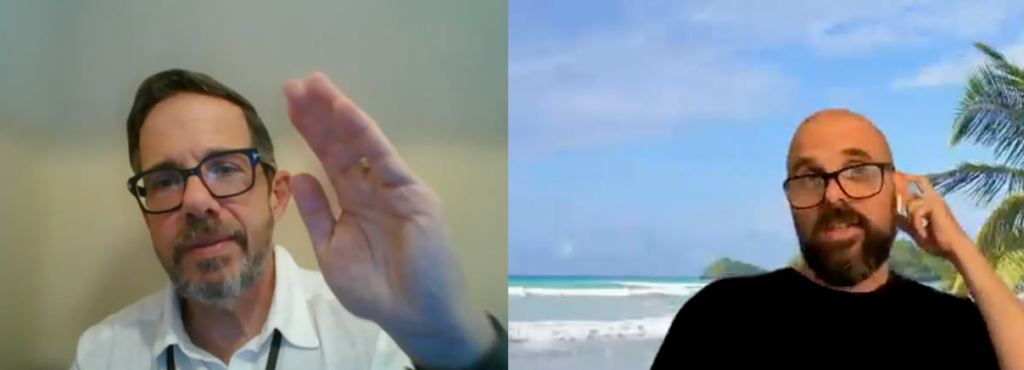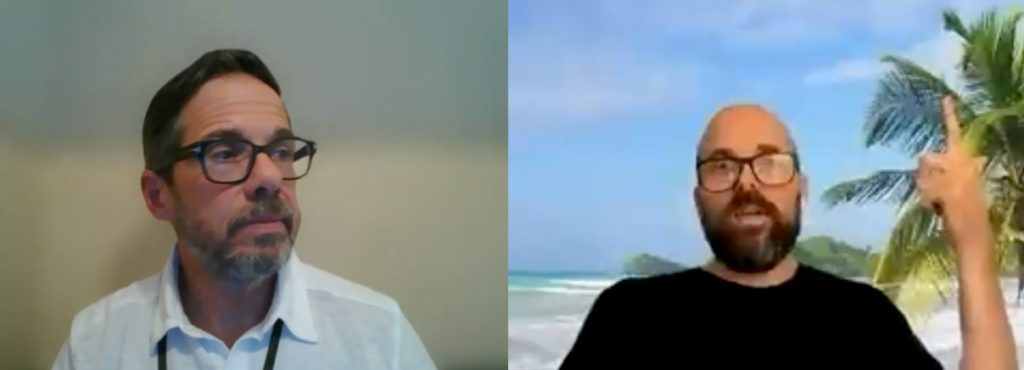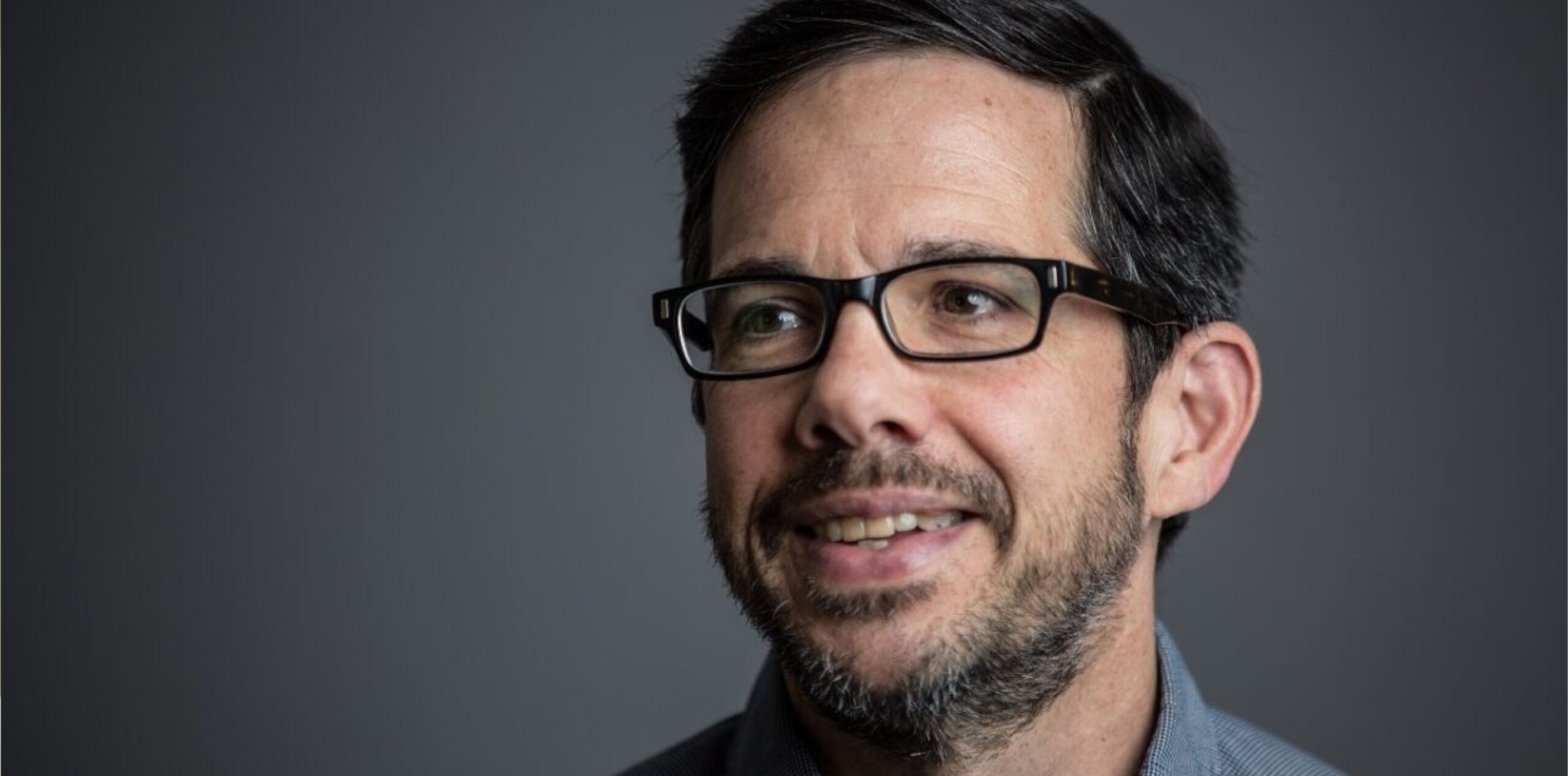Music Publishing & Sync: Where to Start?
#HowWeListen Live: In Conversation with Miller Williams took place on Tuesday, the 30th of August, live from London, UK. Miller Williams, Senior VP Creative, Kobalt Music Publishing.
Miller joined us from London, UK
The following transcript has been edited for length and clarity.
Miller Williams has been in the music business for a long time. He made his way from publishing to record labels and back to publishing. In part one of this conversation, Miller traces how he made his way into the music ecosystem. Marc and Miller also talk about how things have changed in the industry plus sync placement strategies.
The following transcript has been edited for length and clarity.
Marc Brown: Hey Miller! Welcome to #HowWeListen Live: In Conversation. Now, before we get started, where are you calling in from?
Miller Williams: I’m at the Kobalt office in London. We have these little telephone booth things that you use if you need to make a personal phone call. So I’m fairly soundproof here!
Marc: Is it a boring designed box or is it a fancy and funny London red phone booth?
Miller: Ha! It’s neither – just functional, but not super fancy.
Marc: Great! So let’s start with this – what your job is right now?
Miller: It varies quite a bit. My title is Senior VP of Creative. The role encompasses the front-line A&R function of signing new writers and artists to Kobalt publishing. We also have several smaller publishing companies to which we provide creative and administrative services. So, I work across all of the UK publishing company partners.
I also do quite a lot of stuff on the international side. I work on pitching music in places like South Korea, Japan and Hong Kong. I’m also on Zoom calls weekly with our French, Swedish and German offices. We’re now getting into the world of Afro-Beats. So I’m kind of all across the board and work with a lot of different departments.

Marc: OK, thanks. So, let’s rewind to your first job – how did you get into music and end up where you are today?
Miller: Well I had always played music, and I’d been in different bands in college. Music was a hobby. A friend of mine told me that Belmont College in Nashville ran a music business production course. So, I moved to Nashville and got a job working in a hotel and did a semester at Belmont. On the intern jobs board, they posted a job working in a tape copy room. So I ended up working for free in the mornings at this big independent publishing company. I was making cassette copies to send out to pitch songs. Working there led to a paid job at a smaller publishing company based out of the UK.
So eventually, I moved over to London. I worked for the record label PWL on the production side, and then that led me to BMG records doing international records and promotions. After that, I went into publishing with Sony for about 6 years. Then I got an offer to start an independent publishing company called Global Talent Publishing. I did that for about 10 years. Finally, I moved to Kobalt UK Most of my career has been in publishing. It was, however, also good to see other sides of the music industry.
Marc: So there was a music program at Belmont. When I started in music in the ‘90s, there was nowhere really to go. So it’s cool that there was a school back then! Was it in production?
Miller: Belmont did offer a full BIMM or ICMP type program, music business and production) even back then. I thought I wanted to work in a studio and be a producer but I soon learned that I didn’t have the patience for it. It was a great experience, but I think because I was a bit older I realized I didn’t need another college degree to be in music, and I just kind of landed in publishing by luck. For me, it’s the thing I like doing the most.
Marc: I had a similar path. I dropped out of university to get experience and volunteer for free. Now I have learnt that is a big no-no. Nowadays, any free work tends to be turned down. That is a great thing. Back in the day, that is just how you had to start. I did it for a year I think.

Miller: Same here – it was about a year as an intern then I finally started getting paid. That was just how you got into the business back then.
Marc: Yeah, it’s great that there are schools now. I’ve spoken at BIMM, and now there are a lot of choices. It’s a good way to learn. Back in the day, it wasn’t as easy to get all the information you needed.
Miller: For sure. I learned everything I know about publishing just by doing and observing people who were good and experienced at what they do. When I left Sony and started Global Publishing I didn’t have a lot of background in administration and royalties and those things, so I had to learn by doing. It is good that there are now colleges and music schools so you can streamline yourself and decide whether you want to be a performer, songwriter, on the business side or whatnot.
Marc: When did you start Global?
Miller: It was 2001, I think.
Marc: I’d love to talk about the way publishing was back then, and how it’s changed now. Like I seem to remember that doing syncs was a no-no – how do you remember the publishing landscape in the mid-’90s and early ‘2000s?
Miller: Oh, it was very different. When I was at Sony there was no sync person. Again, I kind of fell into it by accident when this film was looking for some electronic music to use. I pitched some new music by Orbital and they took it straight away. That experience made me think that it was easy. Today I know that it is quite difficult. Back then, I also pitched a song to the BBC for the Olympics in Australia and they wanted to use it, but the band turned it down. I couldn’t believe it.
Marc: What was the money like on that one? Or was it more for the exposure?
Miller: It would have been for the exposure. Here in Europe, the BBC have a blanket broadcast agreement, they just pay a fee every year and can use whatever music they want. In America, you have to license every piece of music that’s used on a TV program. And yes, back then a lot of bands didn’t want their music to be used on TV or in certain commercials.
Marc: But the money was great too right?
Miller: Yeah, it was much better than it is now because there was no streaming or YouTube. It was odd though because the bigger artists, who were getting the biggest money offers, were saying no. The smaller artists were happy to accept the offers.
Marc: I remember that. Looking back it’s mind-blowing considering how different it is now. What about video games back then, they were just getting started, how did that work?
Miller: When Playstation was starting the licensing was much different. We were able to do royalty deals where we got a small royalty for the music used on every game they sold. That lasted a few years and then the game companies decided that they’d rather just pay a blanket sync fee. I used to argue that if the game flops, they don’t spend money on music but if it does well then the writers are properly compensated. They didn’t see it the same way, so now it’s just the sync model for music when it comes to video games.
Marc: So I want to know how people eventually got over this idea that music for commercials was uncool? Did the creative element get better?
Miller: I think before the age of MP3s and downloads, there was a lot of money being made by both artists and labels because people still bought CDs. This is no longer the case, so now people need more sources of income. If you’re a manager and you see your margin go down because you see your record sales going down, maybe you need to change up your strategy. So licensing music for TV ads, TV shows and games became the new thing. I never found placing music in TV or films problematic, but bands would sometimes have issues with being associated with a certain brand in a TV ad. Maybe this younger generation also grew up with TV ads, so it’s not as much of a problem.
Marc: tell me about moving on from your Sony days, and setting up as an independent publisher. What was the competition like? Today there seem to be a lot of options, and record companies to sign with. Back then, maybe not so much. What was the publishing landscape like?
Miller: There’s always been a pretty healthy environment in publishing with both major and independent publishing companies so that hasn’t changed. Hopefully, the royalty process is better for writers because we have better technology now and it’s easier to register songs electronically. There’s still room for improvement, but it’s better than it was.
Marc: How much better do you think it is? I’ve heard a lot of people say royalties are still terrible, so in your experience do you think that artists are getting paid most of their money?
Miller: Well, it depends on who your publisher is. Back in the day, everything used to be on paper so you would have to look line by line to make sure you were getting paid the right amount, and if there was an issue you’d have to talk to a bunch of people to get it sorted.
Nowadays it’s electronic so any one song can collect a ton of sources of revenue automatically. It’d be impossible for people to do paper statements now. It was less complicated back then because you just had mechanical royalties from the sale of a physical product, and performance income from radio play or TV ads, and then you had synchronisation.
Marc: So 3 revenue streams.
Miller: Yeah, and that was kind of it. Now you have those 3 revenue streams plus you have streaming, apps, NFTs etc.
Marc: Do you think anyone is getting royalties off of NFTs yet?
Miller: Yeah, we’ve just launched one with an artist who partnered with a visual artist. It’s one of the first we’ve done, usually, record companies will be the drivers behind NFTs. We do the licensing that covers the royalties from the sales of NFTs.
Marc: So now you have at least double the number of revenue streams. The original three would still offer up the more significant sums, and then the newer revenue streams you mentioned… would you probably get thousands and thousands of little percentages of payments?
Miller: Yes, but one upside from streaming is that you can now market music on a global scale. The way it used to work was that if you signed an artist in the UK, for example, you had to market them and find some success for them in the UK before subsidiary companies in other territories would spend any of their money in their territory. So that often meant that an artist would be massively successful for the UK label, but they could never get the U.S to do anything. Now, it’s a bit more democratic because once something is up on a streaming platform, everyone has access to it. I’d say that the pie is getting bigger, but the shares are getting smaller.
Marc: OK. So getting back to back-in-the-day, an artist would sign to a publisher and then they would have had sub-publishers elsewhere who would collect the money for each territory.
Miller: Well Sony had their own offices around the world, so everything went through the Sony system and they’d collect the royalties themselves, which would eventually get back to the writer. Another way to do it is to have independent companies in every territory collect your royalties for you. They do a great job, but I think it’s increasingly more difficult for them. The tradeoff is: going through a major publisher, your collections might be a bit better because it’s all being looked after in one place, if you go the indie route, you have more paperwork but you might get more attention because they have smaller catalogues.
Marc: So today if you go to a bigger publisher, are they doing all of the collections for themselves worldwide? Is it more centralized because of technology?
Miller: Yeah. So using Kobalt as an example, we do have some self-publishers in different places like Japan for example, since the Japanese market is dominated by local artists. Our catalogue is mostly Anglo/American, so for us to be a direct publishing member we would have to have an office there but that wouldn’t make a lot of sense for us. So that’s why we have a self-publisher there.
But Kobalt is a direct member of each of the performing and mechanical right societies in places like the U.S, Canada, Germany etc. This means that writers in these locations send us their song registrations and release information, and we register all of those songs correctly electronically with all of these societies around the world. Then the money comes back to Kobalt and we do all of the administration and the money is distributed to the artists. The majority of the administration is done here in London.
Marc: So say I’m a singer-songwriter and I write my songs. Before, you would try to get signed and get an advance on your publishing. Considering how the environment has changed, what do you think artists and performing artists should be doing nowadays?
Miller: Most major publishers will stand back and observe, see how things develop. So if you’re an artist and your main focus is becoming successful, it’s about building a fan base and doing the work. You might get lucky and go viral on TikTok, but I think a lot of it has to do with releasing good music, getting out there and building a fanbase that way. I’d recommend starting as DIY(Do It Yourself) and once you build a buzz and a fanbase the bigger companies will take notice.
Marc: So what do you think artists should do with their publishing in the meantime?
Miller: Well if you feel like you’re a great writer and can hold out for a bigger deal, you should do that and keep releasing your songs. You can join one of the music societies as a writing member and just get on with it to see where it leads. Otherwise, you could sign a publishing deal with an independent company. When I was in that space, I liked to sign people early and work to grow them – a boutique publishing space. I gave a lot of attention to each artist because I didn’t have a huge roster or an unlimited amount of money to spend on things. As such, I had to be pretty cautious. I could take the time to turn something from zero to hero without too much of a financial risk. Especially if it didn’t work out.
So it all depends on what you want. If you want a lot of help early on, then an independent small publisher is probably a better route to go but of course, they have to love the music. Of course the deal you’ll get offered won’t be as good as if you waited and had a deal down the line with a bigger publisher.
Marc: Say I was in a band and I convinced a smaller publisher to take me on. Do I have any chance of getting any syncs? Is it about having someone reputable pitch your songs? Or, is it just impossible to get syncs when you first start?
Miller: I can’t say for sure. I know there are some sync agents that you can approach and they will pitch unpublished songs. But from what I’ve seen, the people that get syncs are usually due to them having developed relationships with music supervisors and advertising agency professionals. Like anything else in the music industry, it’s about relationships. If someone reputable is vouching for you and knows sync people then it’s probably going to be easier.
Marc: So I have a question. When it comes to getting a song placed on TV, film or in an ad, does the production need to be perfect or does it depend on the campaign?
Miller: Yeah ultimately, it has to fit the brief, the mood and the storyboard. Sometimes you’re just in the right place at the right time with your song where all the sync agents want to use it. There’s no recipe for how it happens but sync agents and music supervisors are the gatekeepers into that whole world.




